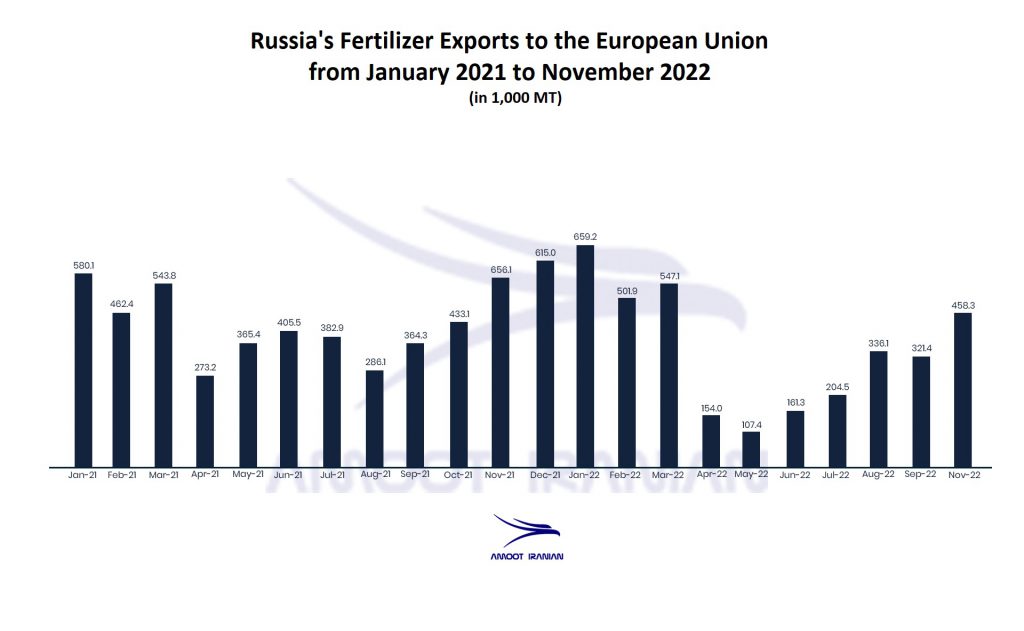.
In this article, we investigate the position of Russia in fertilizer exports to the European Union from the beginning of 2021 to the November 2022.
.

.
A Shifting Landscape: Is Russia Changing Position in the European Union Fertilizer Export Market?
Russia is a significant manufacturer of the primary fertilizer types, including nitrogen, phosphate, and potash (NPK), and is also a leading fertilizer exporter to other parts of the world.
Due to its invasion of Ukraine, Russia, which used to manufacture approximately a quarter of the world’s nitrogen fertilizer, has essentially withdrawn from the market.
Russia’s gas exports to Europe have been significantly reduced, and this has had a considerable impact on fertilizer production in the region.
The war in Ukraine has a significant impact on a product that is not usually visible to most consumers.
.

.
Around 50% of Europe’s nitrogen fertilizer production capacity is currently offline. Additionally, since it is a global market, the elimination of one supplier can have significant reverberations!
As a result, several nations are altering their crops or decreasing their use of fertilizer, which is leading to the production of lesser quantities of food.
If the prices of fertilizers continue to remain high for an extended period, farmers will face increasing difficulties in acquiring them, and this will lead to a decline in their crop yields.
The sanctions imposed on Russia are having an adverse effect, with shipping and insurance firms becoming increasingly cautious about transporting Russian goods.
.
Russia’s Waning Influence in the Global Fertilizer Industry
As mentioned previously, the war between Russia and Ukraine has had a significant impact on the global fertilizer market.
Russia is a major producer and exporter of nitrogen, phosphate, and potash fertilizers, which are crucial for crop yields and global food production.
Let’s check the numbers and charts below to see how war in Europe is disrupting fertilizer supplies!
.

.
Russia Fertilizer Export to the European Union from January 2021 to November 2022 – A Comparison Between 2021 and 2022 (in 1,000 MT)
| Month | Russia Invade to Ukraine | 2021 | 2022 | YOY Change |
| January | Before the war | 580.1 | 659.2 | + 13.6% |
| February | 24 days before the war & 6 days after the war | 462.6 | 501.9 | + 8.4% |
| March | After the war | 543.8 | 547.1 | + 0.6% |
| April | After the war | 273.2 | 154 | – 43.6% |
| May | After the war | 365.4 | 107.4 | – 70.6% |
| June | After the war | 405.5 | 161.3 | – 60.2% |
| July | After the war | 382.9 | 204.5 | – 46.5% |
| August | After the war | 286.1 | 204.5 | – 28.5% |
| September | After the war | 364.3 | 321.4 | – 11.7% |
| November | After the war | 656.1 | 458.3 | – 30.1% |
.
As you can see above, the Russia fertilizer export to the European Union increased 13.6% from January 2021 to January 2022, when there was no war between Russia and Ukraine.
As soon as Russia invaded Ukraine on 24th Feb 2022, the Russia fertilizer export to the European Union experienced less growth in February and March 2022 compared with January 2022, respectively +8.4% and +0.6%.
After April 2022, Russia fertilizer export to the European Union faced severe reduction, this diminution started from April 2022 and continued till November 2022.
The highest reduction was in May 2022, in which Russia fertilizer export to the European Union decreased 70.6% compared with the previous year, May 2021!
However, in other months, the story was not good too!
.
Let’s Work Towards a World Where War Is a Thing of the Past
The 2022 war between Russia and Ukraine was a devastating event that resulted in countless disadvantages and negative consequences.
While conflicts like wars have always had negative economic impacts on the world, the loss of innocent lives is perhaps the most profound consequence of such conflicts.
One of the main disadvantages of wars is the destruction they cause.
In the case of the 2022 war between Russia and Ukraine, entire cities and towns were destroyed, leaving the people who lived there without homes, basic services, and necessities like food and water.
Additionally, infrastructure such as roads, bridges, and hospitals were also damaged or destroyed, making it even more difficult for the affected communities to recover from the conflict.
.

.
Wars also have a significant economic impact, both on the countries involved and on the global economy.
The costs of warfare, including expenses related to military operations, reconstruction efforts, and compensation for those affected by the conflict, are enormous.
These costs not only strain the economies of the countries involved, but they also divert resources away from other important areas such as education, healthcare, and infrastructure development.
The ideal world is one where war is replaced by cooperation and understanding!
